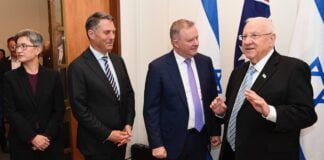THE CAMPAIGN against electricity privatisation has reached a critical stage in NSW.
 Concerted campaigning within the ALP and amongst the public secured an overwhelming vote against privatisation at the ALP state conference in early May. Eighty-five per cent of the general public also opposes privatisation. This has been reinforced by the widespread concern regarding global warming.
Concerted campaigning within the ALP and amongst the public secured an overwhelming vote against privatisation at the ALP state conference in early May. Eighty-five per cent of the general public also opposes privatisation. This has been reinforced by the widespread concern regarding global warming.
The conference vote and continued lobbying of state ALP politicians has meant that some have opposed the legislation in caucus. A number are also willing to cross the floor and oppose the legislation in the lower and upper house.
However, it looks increasingly likely that Iemma will succeed in getting privatisation enabling legislation through both houses of parliament. He has ignored opposition within the party and frantically introduced a pro-privatisation bill in an attempt to resolve the intense conflict within the party over the issue.
But the campaign is far from over. Unions NSW secretary John Robertson has so far refused to accept compromises over the privatisation model.
Since Iemma spurned the conference decision, the Unions NSW strategy has revolved around lobbying Labor MPs in an attempt to get the parliamentary caucus to follow ALP policy and the conference decision.
While every extra MP compelled to publicly oppose privatisation and cross the floor is an asset to the campaign, we cannot rely on local lobbying or on negotiating a compromise.
Trying to draw the unions into a compromise deal is a strategy of the government’s designed to divide and weaken the campaign. It was a huge mistake for Newcastle Trades Hall Council to cancel a planned rally outside the May 27 cabinet meeting in Maitland because, according to THC Secretary Gary Kennedy, “we don’t want any sort of incidents to jeopardise negotiations”.
Only a minority of Labor MPs are considering crossing the floor. It is now very likely that the Liberals will support Iemma’s privatisation bill. Iemma has redrafted the bill to accommodate the Liberals’ stated requirements for the bill to get their support.
A parliamentary vote may yet kill off privatisation. But the campaign needs a plan for what to do if the bill gets through.
There may still be months between the passage of the enabling legislation and the government finalising a sale to a prospective buyer. Iemma is hoping that he will be able to push his privatisation proposal through with minimal damage to the party or his reputation.
But, so far Unions NSW has been wary of discussing further industrial action, fearing that it may undermine public support or will be difficult to build amongst union members.
There have been no public calls for mass rallies outside parliament house to pressure MPs.
But the government is massively unpopular. There is a mood to fight Iemma, but it will eventually give way to demoralisation unless Unions NSW is prepared to mobilise it.
Thanks to pressure from ETU members, their union was discussing further industrial action as Solidarity went to press, possibly timed to occur between the passage of Iemma’s bill through the lower house and its introduction into the upper.
This needs to culminate in a united mass rally in central Sydney for maximum effect. Unions NSW should be talking of mobilising other public sector workers and other unions to back them up.
The Iemma government is deeply unpopular over its underfunding and disastrous handling of public health and transport and is also under attack by unions over its attempt to cap the pay of public servants below inflation and to impose changes to the teachers’ staffing agreement.
A defeat for the government over privatisation will put unions in a better position to beat its public sector pay limit. The call for a day of action needs to be widened, strengthened and built. A day should be set for a mass protest as soon as possible and union mass delegates’ meetings convened to develop a strategy and plan for further action.
Move this resolution at your union, Labor party or Greens branch
We call on Unions NSW to:
1. Set a date for a mass protest of all union members and supporters against power privatisation, to coincide with strike action by ETU members.
2. Convene union mass delegates’ meetings to discuss through strategy for the anti-privatisation campaign and plan for the day of action.
By Kieran Latty





